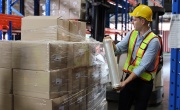Industry reacts to release of Simpler Recycling
Following the release of the details of Simpler Recycling (previously Consistency Legislation), organisations across the waste and resources industry have reacted.
Anaerobic Digestion and Bioresources Association (ADBA)
 Charlotte Morton OBE, Chief Executive of ADBA, said: “ About time! – was our first reaction as separate food waste collections have been on the agenda for many years now, with the deadlines repeatedly delayed.
Charlotte Morton OBE, Chief Executive of ADBA, said: “ About time! – was our first reaction as separate food waste collections have been on the agenda for many years now, with the deadlines repeatedly delayed.
“Separate food waste collections are the cornerstone for an effective implementation of Defra’s Food and Drink Waste Hierarchy and now Local Authorities and anaerobic digestion (AD) operators can plan with confidence to put contracts and infrastructure in place to ensure inedible food waste goes to AD treatment as the first recycling option. The food waste collected will provide an invaluable new source of feedstock for AD plants to produce renewable gas for heat, electricity and transport fuel, and biofertilisers for soil health and improved crop yields.
“It’s a great step forward to establish a circular economy around food waste and food production for the benefit of all, and to ensure increased energy and food security in England. We’re all winners in this and it is imperative that no further delays are incurred in rolling out separate food waste collections.”
CIWM
CIWM says it believes the proposal for a national-level assessment that would enable the widest range of collection methods to be used, rather than a local assessment process on a case-by-case basis, is a pragmatic and sensible approach. It hopes this will allow local authorities to implement the collection systems that are most effective in their areas. The institute added that it’s pleased that local authorities will be able to charge for garden waste collections if they wish to do so, as, in many cases, this provides vital funds required to keep services going.
Lee Marshall, CIWM Policy and External Affairs Director, said: “We have been waiting for this announcement for what feels like an age, so it is great that we now have the details. The flexibility around collection systems appears to be a sensible way forward and I am sure local authorities will be pleased with that approach.
“The deadlines for implementation, especially for film, remain challenging given the delays we have had, and there will be concern about procurement bottlenecks that these relatively short deadlines may cause.
“The proposal to restrict residual frequency to a maximum of fortnightly is, however, unwelcome, as there are numerous examples of how this helps increase recycling and makes collections more cost-effective.”
Confederation of Paper Industries (CPI)
The CPI has said it is deeply disappointed at the Government's announcement not to introduce separate collections of paper and card in Simpler Recycling. It says the decision – coupled with the intention to introduce exemptions to allow for commingled collections – is profoundly disconcerting. Alarmingly, the quality of materials collected has been overlooked, which will lead to an increase in contamination, drive up reprocessing costs, and consequently deter investment in the paper recycling sector.
The confederation continued to that it is both surprising and concerning that, despite the extended time taken to release this response, the Government has neglected crucial environmental considerations. It adds that the limited references to quality in the response itself epitomises the Government's neglect of this aspect of collections and reinforces the perception that its only focus is quick and easy wins to increase recycling rates and that such gains are likely to be illusory as much of the recovered material may be too contaminated to either recycle in the UK efficiently or sell abroad.
Ecosurety
Policy and Innovation Director Robbie Staniforth commented: “These proposals are very similar to what we had anticipated. Setting a clear horizon for what citizens can expect to be collected from their homes and places of work is a vital step towards greater participation and confidence in the recycling system.
“The action on plastic, in particular, lays down the challenge for the EPR Scheme Administrator, local councils, waste management companies and end reprocessors. It is pleasing to see that plastic pots, tubs and trays will be collected from businesses by 2025 and households by 2026.
“We are humbled that the Government has credited our Flexible Plastic Fund initiative for the work undertaken to pilot collection and recycling infrastructure in their announcement. We look forward to passing on our learnings to the EPR Scheme Administrator as soon as is practicably possible so that they can scale up the collection of plastic films and flexibles well in advance of the 2027 mandatory deadline."
Food and Drink Federation (FDF)
Director of Corporate Affairs and Packaging at the FDF, Jim Bligh, said: “We’re pleased to see the government publishing their much-delayed plans for Simpler Recycling, and making a first step towards creating the conditions necessary to establish a circular economy in the UK. Making it easier for households to recycle the same materials wherever they live in England is critical to driving up England’s recycling and reuse rates.
“Food and drink producers will soon be paying an annual bill of £2 billion to fund the circular economy, known as Extended Producer Responsibility (EPR). Getting Simpler Recycling up and running quickly, efficiently and effectively is therefore important to us and government will need to act decisively to ensure sufficient investment now goes into Britain’s fragmented and dated recycling infrastructure.
“To do this, and as happens in world-leading circular economies such as Canada, industry must be given ownership of packaging materials throughout their lifespan and operational control of the recycling system. If this can be done, there will be huge benefits for consumers – in driving down the costs of recycling and driving up the use of recycled packaging for everyday products.”
LARAC
LARAC said it applauds the Government response to the reforms but has expressed concerns on frequency limits and cost implications.
Cathy Cook, Chair of LARAC, said: “We applaud most of the announcements in the consistency response. Notably, our members now have the freedom to choose how they collect dry mixed recycling and the option to charge for garden waste. Introducing flexible plastic collections in 2027 and weekly food waste collections in 2026 is also a welcome step. However, we remain concerned about potential bottlenecks and price hikes resulting from concurrent procurement by local authorities.
“We find the proposal to restrict residual waste collections to at least fortnightly disappointing. Collection Blueprints in Wales and Scotland have shown how limiting residual
collections while providing weekly food waste collections are instrumental in encouraging
recycling and minimising non-recyclable waste.
“Feedback from our members underscores that, on average, 40 per cent of household rubbish is food waste. Weekly and fortnightly refuse collections do not incentivise food waste recycling. Therefore, we challenge the government's assertion that weekly food waste collections alone will significantly reduce landfill waste.”
Local Government Association (LGA)
Cllr Darren Rodwell, environment spokesperson for the LGA, said: “Public satisfaction with local waste services remains very high, which councils have worked hard to achieve.
“What works in urban centres is different to rural communities. We are pleased the Government has listened to the LGA and councils and decided not to significantly reduce the flexibilities in how councils collect waste from people’s homes.
“Our national ambitions for waste and recycling will only be achieved by fully empowered local delivery, alongside measures transferring the costs from taxpayers onto the waste producers.”
National Association of Waste Disposal Officers (NAWDO)
NAWDO has welcomed the announcement but notes that whilst there is some clarity for the waste sector, the Government’s response is lacking detail in a number of key areas which means that implementation remains a challenge.
It says that the industry still does not have certainty with regard to funding, whether that is coming from the Government under the New Burdens doctrine for food waste, or from producers through EPR for packaging. Funding certainty is critical for local authorities to be able to make investment decisions at a time when they face increasing levels of financial pressure.
NAWDO is concerned that, despite some compliance dates being pushed back to 2026, there is a lack of appropriate infrastructure in place to meet the Government’s ambitions on expanding recycling services to a larger core set of materials and introducing universal food waste collections for households. It is unlikely that new sorting and re-processing infrastructure can be brought forward by March 2026, meaning that local authorities may be forced to collect materials for which there is no viable market. NAWDO would like to understand what steps the Government is taking to ensure the wider supply chain is able to deliver against these ambitions.
NAWDO says it is also disappointed to learn that the Government’s planned statutory guidance intends to restrict the options that local authorities will have to work with their communities to reduce waste, promote reuse and encourage recycling, while also cutting emissions, reducing local pollution, and saving money for other essential services. Examples from across the UK, particularly Wales, show that providing a comprehensive recycling service with three-weekly or even monthly collections of residual waste will deliver better recycling rates, result in less residual waste being generated, and help save both money and carbon emissions. NAWDO questions whether the UK will achieve a 65 per cent recycling rate of municipal waste by 2035 if such restrictive policies are introduced at a national level.
NAWDO and its members remain committed to working with the Government, packaging producers, and the wider resources and waste sector on the delivery of Simpler Recycling over the coming months.
OPRL
Responding to the government announcement on Simpler Recycling, Margaret Bates, Executive Director at OPRL, described the statement as a prompt and clear message that will make planning and operations more efficient for local authorities, packaging producers and waste managers.
Bates added: “Defra has clearly worked hard to clarify the detail of Simpler Recycling as quickly as possible, and this statement should be a welcome assurance for local authorities and wider industry. By March 2026, householders in England will all have the same materials collected by their council, which will reduce confusion and increase recycling.
“The removal of the current TEEP exemption system will give local authorities the freedom to collect material in the most efficient way, and to ensure that recycling rates are increased, whether that is by comingled or separate collections.”
The Association for Renewable Energy and Clean Technology (REA)
The REA has largely welcomed Simpler Recycling. Jenny Grant, Head of Organics and Natural Capital at the REA (Association for Renewable Energy and Clean Technology) said: “The REA welcomes the Government’s post-consultation response on Simpler Recycling. Our members have been awaiting further information from government for over two years, so it is very positive news.”
“Government’s planned implementation dates for when food and garden wastes must be collected from households and for business food waste collections, although later than originally planned, now give certainty to industry to ensure we are making the most of these valuable bioresources and their contribution to meeting the Net Zero targets. We have had members with projects on hold, so the publication of planned implementation dates will aid businesses and local authorities, to make progress with their plans.
“Treating food and garden wastes by organically recycling them is a win-win. It enables the production of renewable energy (electricity, heat, gas and transport fuels), reduces biowaste-driven emissions from landfill, reduces contamination of other recycling streams, enables the production of biofertilisers and soil improvers to benefit soils, reduces the need for fossil-derived fertilisers and can partially replace peat in growing media.
“We also welcome the new consultation on the additional policies, and we look forward to working with members and Government to provide further comments on the statutory guidance including allowing co-collection of suitable waste types without submitting a justification in writing.”
SUEZ Recycling and Recovery UK
Stuart Hayward-Higham, Chief Technical Development and Innovation Officer at SUEZ, said on LinkedIn: “For investment certainty, it is really important to have definition, dates and targets that will drive certainty and deliver investment and change. A number of elements of the proposals remain to be confirmed and the legislation itself is required to cement that certainty, but it's great to see things moving again.
“More 'sub' consultations are due, the detail around the exemptions is needed and ultimately the legislation is required to provide the final foundation. Challenging to see how the residual waste proposals can drive more recycling, how the technicalities of materials combinations and mechanical recycling can be reflected in the collection systems and how the quality of recycled products can be maintained and improved through all the changes.
“EPR, ETS, the Recycled Content Plastic Packaging Tax, the Landfill Ban, DRS, SAF and chemical recycling will all also influence the outcomes. It's a complex system today and will become more complex in the future.
“Working together as a value chain, working through the problems, accelerating the opportunities and sharing the journey is fundamental to success. So very proud that a prime example of these fundamentals is represented by the FlexCollect trial and that this example is highlighted in the response.”
The Recycling Association
The Recycling Association chief executive Paul Sanderson said: “Simpler Recycling should end the confusion around what can and can’t be recycled and we welcome the focus on the dry core materials of paper and card, plastics, metals and glass packaging.
“But it is disappointing that local authorities in England will be able to commingle this material, as we would have preferred paper and cardboard to be kept separate as a minimum. That would have avoided contamination and enabled better quality of paper and cardboard, but also the other materials where paper can act as a contaminant.
“The fact that Simpler Recycling will also apply across households and businesses will make it easier for people, whether at work or at home, to understand what can and can’t be recycled. That is a definite positive from Simpler Recycling.
“We would have preferred commercial and household collections under Simpler Recycling to be launched at the same time in 2025 but recognise that a great deal of progress has been made to bring about consistent recycling under these measures. At least now, our industry can start to plan with some certainty.
“On plastic film collections from 2027, we will need to see the detail as it will be essential that these are kept separate from the other core materials.
“We are also pleased that there will be more effort to crack down on rogue operators. Those who move waste illegally bring our entire industry down and it is in all of our interests to remove the criminal element.”
Valpak
Steve Gough, CEO at Valpak said: “This clarity around waste collections will help local authorities, waste managers and producers to plan ahead. Local authorities have been waiting for guidance to inform service arrangements and infrastructure, but the announcement is equally good news for packaging producers.
“Successful recycling hinges on consumer participation. With consistent recycling collections in place across England, packaging brands and retailers will be in a much better position to communicate with householders, via labelling on products or through direct messaging. It is this communication that will drive recycling to the next level.
“While the schedule for changes to household collections by 2026 gives plenty of time for service changes, it also ties in with EPR payments, bringing coherence to the wider EPR system. The decision to scrap TEEP will appeal particularly to some authorities, which have felt constrained by the current arrangements. At the same time, the introduction of weekly food waste collections should have a major impact on circularity across England.”
Veolia
Gavin Graveson, Senior Executive Vice President Northern Europe Zone, said: “Today’s simpler recycling announcement is a welcome step forward to improve the quantity and quality of material that we process. We now need to quicken the pace of UK recycling rates by ensuring that packaging is designed to be reused, repaired or recycled.
“There is still an urgent need for waste reforms, policy visibility, and investment. We strongly suggest that the Government consider escalating the plastic packaging tax to a minimum 50 per cent recycled content to stimulate the market without creating a burden for the taxpayer and focus Extended Producer Responsibility on hard-to-recycle materials such as laminates and composite materials. We need stability in the recycling market to underpin investments so we can stimulate the green economy, create jobs and bring us closer to our net zero goals.”
WRAP
Claire Shrewsbury, Director of Insights and Innovation at WRAP, said: “It’s good to see the publication of the Government’s response to its recycling consultation, and the inclusion of the six key materials and universal food waste collections in England. Making recycling simpler will make it easier to run nationwide communications campaigns to ramp up the recycling rate, and removes the postcode lottery of what’s in, what’s out. And encouraging that more than 2.2 million businesses will now be required to separate their waste for recycling.
“However, continuing to have comingled collections means that many material recycling facilities, which receive this mixed material, will need to look at investment and upgrading to ensure they can produce the quality recyclate required. But for local authorities, today gives clearer direction and more certainty they need to make important investment decisions around their own operations, with a timeline. WRAP will work with trade bodies and local authorities to make any transition as seamless as possible through our tools, technical support, and resources.”







